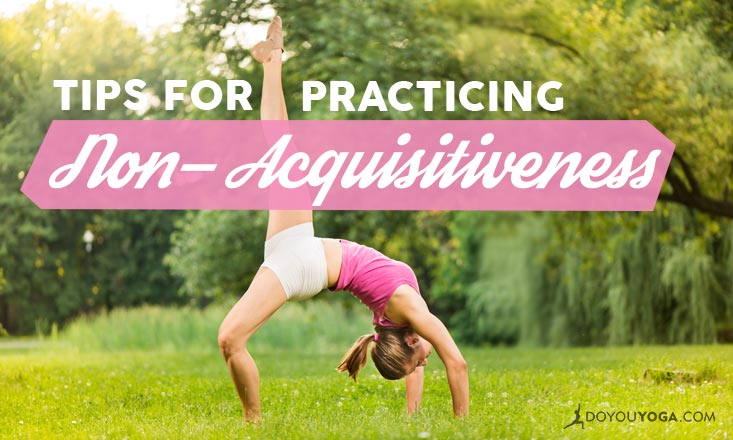The yoga rulebook of life gives us basic ethical guidelines to follow which are the foundation for all actions and thought. These include the Yamas (restraints) and Niyamas (observances) as part of the Eight Limbs of Yoga. The yoga sutras of Patanjali state that any pain experienced while practicing the Yamas and Niyamas is the result of working out one's past karma.
The final Yama, Aparigraha, or non-acquisitiveness, refers to contentment, taking only what you need and what you have earned, not hoarding material items, and letting go of attachments. A person who owns belongings puts time, energy, and money into caring for those belongings. In contrast, a person who owns nothing is absolutely free.
We live in a time and place that is driven by materialism and consumerism, so how do we observe this sutra without compromising comfort and necessity?
1. All You Need is Right in Front of You
What an amazing truth! How many times have you been in want when suddenly there was a shift or a change, and that thing that had seemed so impossible to attain was available at your feet for your taking? This is a universal truth that is proven time and time again, as long as we are open to receive it.
Everything you need is available to you, if you are able to accept it. You must know how to tap into your resources and maintain a positive attitude and an open mind. Sometimes we feel deprived or in want, when in reality we already have everything that we need.
2. Play Reverse Psychology on Yourself
Often feelings of want or desire arise when we are exposed to materialism in our external world. Looking at a magazine, browsing in a department store, or watching other people can bring a feeling of discontentment when we begin to imagine owning or having those things for ourselves.
Instead of eying objects with desire, begin to see them with a touch of judgement. The next time you open up a magazine and see an expensive pair of designer shoes, instead of looking at them with want and wondering if you can afford the price tag, start to cast criticism on the shoes.
“Those are not practical for me.” “The shoes I have on are much more comfortable.” “I don’t know why anyone would waste their money on those shoes.”
You will begin to see that there is some truth to your criticism, and the desire will go away.
3. Turn the High of a Potential Purchase Into the Excitement of Saving
Did you know that watching your savings account grow produces the same emotional high as retail therapy? The same endorphins are secreted by your endocrine system and the brain feels happy and satisfied.
The next time you want to throw a twenty dollar bill at something, put the money in your savings account instead. Those 20s add up — believe me!
Before you know it, you will have hundreds where before you would would have unfulfilling purchases and a bunch of receipts.
4. Acknowledge Your Riches
Instead of dwelling on what you don’t have, focus on what you do have.
Start by making a list of all the things you feel like you want: a new car, a vacation to someplace tropical, a different job. Then, make a second list. This time, write down all the things you already have: the support of loved ones, a stable career, a hiking trail close to your house that you can enjoy anytime, a reliable vehicle.
You might just surprise yourself — the list of haves is bigger and more substantial that the list of have-nots. Focus on the quality of your haves and practice gratitude for each one.
5. Say Thank You
The simple act of gratitude for the little things in life magically turns into overwhelming abundance. If you say “thank you” for every nice thing done to you by someone else, those "thank yous" begin to feel like an overflowing pot of riches.
“Thank you” for opening the door. “Thank you” for that kind smile. “Thank you” for making the coffee. Recognizing the blessings all around us fills up the proverbial bucket, so to speak. When that bucket overflows, there is no room for want because we are already so grateful for all the wonderful things around us.
What tips do you have for practicing non-acquisitiveness? Share them with us in the comments below!


